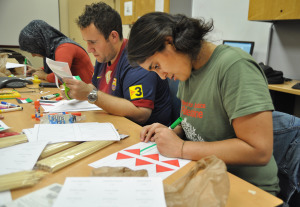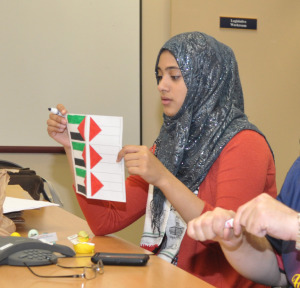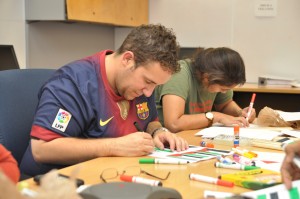
Pop.
Like a pierced balloon, the Students for Justice in Palestine’s excitement fizzled with disappointment.
Students for Justice in Palestine (SJP), an on-campus human rights group that promotes awareness and justice for Palestinians, wanted to release around 352 balloons into the sky as a memorial during Gaza Awareness Week, the week of Feb. 4, for the 352 Gaza children killed in the conflict between Israel and Gaza from Dec. 2008 to Jan. 2009. The Student Union rejected the idea due to “environmental concerns.”
SJP chose to use biodegradable balloons and cotton string for the balloon release in order to be environmentally friendly before putting in the request for the event through the Student Union.
The administrative staff of the Student Union discarded the idea due to “the potential impact of the surrounding areas and the potential impact on wildlife,” as Lauren Adamo, Student Union assistant director stated.
Gabi Aleksinko, SJP spokeswoman, and Matt Schneider, SJP vice president, described their group as being underrepresented and Palestine as relatively unknown to many people. They planned Gaza Awareness Week to put on events in honor of the lost lives of the Palestinians.
Adamo said that the administration cancelled the event based on the policies for the general use of facilities on campus.

When asked which recommendations in the policies guided the event cancellation, Adamo provided the links to the policies, none of which included restrictions on the use of biodegradable materials for university events.
“From the beginning we said, ‘Let’s go with the biodegradable balloons. Let’s go with the cotton string,’” Noor Fawzy, SJP president, explained.
“From an environmental standpoint releasing non native seeds (I was informed that they may be non-native plants) in each balloon into the environment is not environmentally friendly,” Joshua Scholl, the director of the Council of Student Affairs Organization (COSO), said. “These seeds could grow and out-compete important local plants.”
The balloons symbolized the brevity of the children’s lives. A single poppy seed and sunflower seed would fill each balloon and represent growth and development. Fawzy explained that the children of Gaza cherished these two ideas.
Fawzy said that SJP thought the balloon release was the perfect way to represent the lives of the children. She explained that they made sure all the materials were biodegradable or environmentally friendly. Aleksinko continued by saying that she thought the resulting flowers would not only be good for the environment but also be a literal representation of life and growth in honor of the children of Gaza.
The Marine Conservation Society (MCS) said that “if not ingested by wildlife a latex balloon will degrade and break up into smaller and smaller pieces, but will still be present within the water column or local environment.”
These latex fragments will continue to exist unless they are incinerated, the MCS website says.
“We’re very upset,” Fawzy said when she heard from the Student Union that their event was cancelled. “I mean, it was a unique idea that we came up with, and we already purchased the seeds. Now we’re not quite sure what to do with them.”
Fawzy said that SJP is a grassroots organization, “meaning we don’t have much money.” She said that SJP spent almost 10 percent of their yearly budget on the seeds.

The Student Union administrators refused to allow SJP’s balloon release because of the environmental risks involved. Dawn Howard, the Director of Marketing and Communications of Student Affairs, clarified that the Student Union administrators have never approved an event involving the release of biodegradable balloons in the specific areas of campus that they are in charge of. They requested that SJP come up with a replacement event for the balloon release.
Fawzy said that although she and her group were disappointed, they thought of another way to represent the fallen children of Gaza. The Student Union administrators’ approval of the replacement event kept Gaza Awareness Week from being cancelled, Fawzy recounted.
Instead of balloons, SJP decided to dot the free speech lawn with 350 to 400 Palestinian flags and 25 to 50 stuffed, white garbage bags. Fawzy explained that the Gaza people take their martyred and put them in bags, tie them, and bury them. They chose to demonstrate this by stuffing white garbage bags with Styrofoam or crumpled paper, tying them, and splattering them with red paint to represent the dead bodies of the Gaza martyrs. Fawzy said that they plan to lay these “body bags” on the free speech lawn for the Children’s Memorial on Tuesday during Gaza Awareness Week.
“It’s unfortunate that they cancelled the event, and I think it would have been really great,” SJP member Renata Glebocki, political science sophomore, said about the balloon release. “I know that we are going to still do other things that are awesome, so to make up for it in a way.”
Lisa Metcalf, Media Relations director, affirmed through email that FAU follows The Environmental Protection Agency (EPA) guidelines which “states that balloon releases pose a serious threat to wildlife.” Although asked where this statement is located within the EPA guidelines, Metcalf did not provide a response.
When SJP had to make a replacement for the balloon release, many of the group members expressed the feeling that they sometimes have to “jump through extra hoops to do what we want to do,” as Fawzy said.

Fawzy and Aleksinko recounted one of SJP’s events that occurred in April 2012, where they posted 200 mock eviction notices in elevators and on random dormitory doors. Aleksinko said that SJP received approval for distributing the notice, but that they faced harassment and opposition when the event was over. The Palm Beach County seal on the lower left-hand corner of the notice caused the uprising, Fawy said.
She said, “The local- and campus- based pro-Zionist opposition went up in arms.”
President Noah Tenenbaum of Owls for Israel, an FAU group promoting awareness and advocacy for Israel, explained that most of his group’s events have run smoothly. He said they only encountered slight problems when getting guest speaker Noam Bedein, CEO of Sderot Media Center, to the Golden Pavilion in Oct. 2012, although the issue was with coordinating the speaker’s arrival, not with FAU administration.
Tenenbaum expressed the opinion that SJP presents one-sided facts and explained that there are civilian casualties on both sides—Israel and Gaza.
“A lot of their facts are very demonizing of Israel and are not necessarily right,” Tenenbaum stated.
On the other hand, Fawzy felt the Owls for Israel have an easier time planning events. With the Golden Pavilion and Hillel center, she said they “go on without say from the university.”
Despite the obstacles, Fawzy focused her energy on planning a new event to recognize the lives lost.
“It’s the least we could do for the people of Gaza,” she concluded.


















